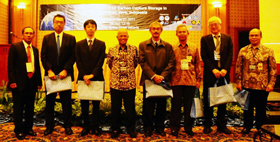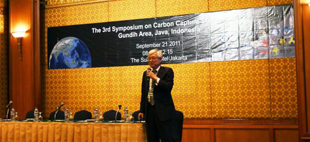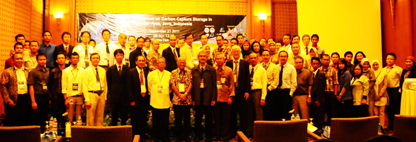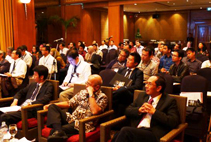Events
THE 3rd SYMPOSIUM ON CARBON SEQUESTRATION AND CAPTURE (CCS) IN GUNDIH AREA, JAVA-INDONESIA
Date: September 21, 2011 (08:30 - 12:15)
Venue: Sultan Hotel, Jakarta, Indonesia
Organized by:
- Institut Teknologi Bandung
- Kyoto University
- Kyoto University Global COE Program "Global Center for Education and Research on Human Security Engineering for Asian Megacities"
Co-organized by:
PERTAMINA, JICA, JST, RISTEK, EBTKE, DIKTI, BP MIGAS, Fukada Geological Institute, JAPEX, RITE, University of Tokyo, University of Toyama, Waseda University, Akita University, and Kyushu University
Number of attendants: 113 persons
Poster
Report 176
Outline
The purpose of this symposium is to deepen the understanding of CCS activities from the various technical and non technical aspects, and to prepare the implementation of CCS in Indonesia as an effort to reduce carbon emissions. Many Indonesian and Japanese Earth scientists from many universities, research centers, government and companies have gathered in this symposium.
Report
The symposium was held on September 21, 2011 at the Sultan Hotel, Jakarta-Indonesia and organized by KU, ITB, and KU Global COE on HSE. There were 12 presentations which were attended by 113 participants. The Symposium was opened by a leader of CCS Project from Kyoto University (Prof. Toshifumi Matsuoka) and continued by the speech session. In this session, Prof. Toshifumi Matsuoka and Prof. Wawan Gunawan introduced the international research collaboration on “Pilot Study for Carbon Sequestration and Monitoring in Gundih Area, Java – Indonesia”. They mentioned the big issues for developing clean and sustainable energy, and the contributions that can be given by Indonesian and Japanese Earth Scientist especially in the implementation of carbon capture and storage technology in Indonesia.
Dr. Teguh Rahardjo mentioned the CCS on the RISTEK view points. He supported the CCS pilot study in Indonesia. Dr. Kardaya Warnika presented the CCS as a Part of Clean Energy Initiative. He mentioned that the pilot study of CCS can be a part of the national strategy that addresses climate change. In addition, he mentioned that CCS has to be combined with other strategies and other policies in order to be part of an effective solution. He fully supported the CCS research project in Indonesia.
Mr. Awang Satyana presented the Carbon Capture & Storage (CCS) on BPMIGAS Points of View. He explained the upstream petroleum activities, the CO2 concentration in Indonesia Petroleum Reservoirs, and the managing CO2 for upstream petroleum activities. Mr. Akira Matsunaga presented the JICA’s Contribution to “New, Renewable Energy Development and Energy Conservation” in Indonesia. Regarding the clean energy initiative that supported by Indonesian government and the international community, Mr. Akira Matsunaga mentioned that the goal stipulated in the Vision 25/25 will be achieved. In addition, JICA ready to support Indonesia’s Initiative by all means. Mr. Masahito Yano from JST mentioned the mission & vision, the activities of JST, and the SATREPS program (Science and Technology Research Partnership for Sustainable Development) in connection with the CCS pilot Study in Indonesia.
After the speech session, there are presentation sessions followed by questions and answers at the end of each presentation. At the beginning of presentation sessions, Mr. Hilmi Panigoro has mentioned the causes and efforts to minimize the negative effects of climate changes, especially in minimizing carbon emissions. Dr. Doddy Priambodo presented the CCS pilot study in Gundih area. He mentioned that the Greenhouse Gas Emission in Southeast Asia is increasing, twice of global average. In 2050 it is expected that the reducing of global CO2 emission will be more than half and restriction of the atmospheric CO2 concentration to 400-500 ppm. In this case, the CCS is a key of CO2 abatement options. Prof. Akira Saito presented the CCS Monitoring by Electromagnetic Methods (EM). He mentioned about the EM methods, some results of oil exploration, and the application of Electromagnetic method for CCS monitoring. Dr. Kyosuke Onishi presented the CCS monitoring by seismic tomography. He mentioned that monitoring CO2 flow is important to control injection amount and to evaluate reservoir potential. Combining geophysical prospecting with well log data and laboratory test provide the effective values to estimate the conditions of CO2 flooding.
The last presenter was Dr. Keigo Kitamura who presented the experimental approach to estimation of CO2 saturation in deep reservoir. He mentioned that seismic survey is the important and powerful methods for CO2 monitoring.
The symposium has been successfully conducted. After the symposium, the Japanese and Indonesian delegates visited Gundih Area for field excursion and attended several meetings in Indonesia to discuss the implementation of CCS pilot study that will be started in 2012.




